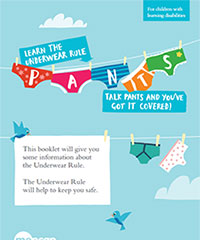A new version of the NSPCC’s successful campaign the Underwear Rule was recently launched to help parents teach children with a learning disability about sexual abuse. The NSPCC and Mencap have joined forces this Child Safety Week to make the popular guide accessible for both parents and children with a learning disability.With more people than ever before contacting the NSPCC helpline (0808 800 5000) about sexual abuse and research indicating that disabled children are three times more vulnerable – both the NSPCC and Mencap are encouraging parents to talk PANTS with their children to help keep them safe.
However, my view is that the booklet is too complex for many children with learning disabilities, The booklet – the PANTS guide – opens with the PANTS acronym and an explanation as to its importance:
How to remember the Underwear Rule There is an easy way to remember the Underwear Rule.
Remember the word PANTS.
The first letter from each of the rules makes up the word PANTS.P Privates are private
A Always remember your body belongs to you
N No means no
T Talk about secrets that upset you
S Speak up. Someone can help
The concept of an acronym is too complex for many children with a learning disability.
Concepts such as an adult you trust are also too difficult for many children as is the ability to telephone Childline. The concept of the right to say No is also problematic as children cannot say No to many things such as going to school; having a bath and their hair washed; having their ails cut; washing their hands; or wearing a seat belt in the car.
Children with more severe learning difficulties, particularly those on the autistic spectrum, need simple, straightforward and unequivocal rules, such as:
- Someone can only touch you between your legs (or your willie) if its Mummy (or other main carer or Mummy (or other main carer) says it’s OK. (This covers bathing, medical examinations or treatment or similar)
- If someone tries to touch you ors touches you between your legs (or your willie) you must say no and you must tell Mummy (or other main carer) straight away.
- If someone shows you his willie or ask you to touch it, you should say no and you must tell Mummy (or other main carer) straight away.
It’s important to use words that the child understands for their private parts and to name the person of people that they should tell. And to go over the rules many times.
I’m delighted that efforts are being made to protect children with learning disabilities from abuse; but something less complex is needed to give the more vulnerable children, who have least language, least ability to understand and fewest means of making themselves understood. They need simple clear rules – and to be protected by adults.

I agree completely – children need clear unambiguous information. It is not an option for them to say ‘no’ to a whole range of activities – as you say hair brushing, school, seat belts etc etc.
PANTS means ‘worthless’, i.e. that blog was really pants…..
I would like to adopt a devil’s advocate position, i.e what I am about to write is not necessarily a position I would like to defend (mainly because I do not claim ‘expert status’).
People with disabilities are people. We live in a world where people are defined by their ostensive attributes (what they look like, what they own, and how they wear their wealth). A young person/young adult with learning difficulties is totally dependent on significant others who make decisions about their welfare/wellbeing. So what about sex?
Major problem for parents, teachers, care workers as this is as much contested arena.
As a teacher I had to deal with 19 year old, IQ around 23, 12 inch penis who masturbated in and around the local teachers center. I was the teacher who had to constrain the ‘boy’ (‘boy’: 19 years old?). As his teacher, it was a question of what to do. The general consensus (circa 1979) was ‘cut it off’.
In 1984 a special school head described ‘sex education’ for children/adults with learning disabilities as ‘incitement’.
Hey ho!
Sex abuse ? PANTS? Fondling may be the nearest that children/adults come to any kind of sexual fulfilment. Somebody at least has taken an interest in exploring below the incontinence pad. Grotesque?
Neil Shaban, as significantly disabled man in the 1990’s put a video on line (early days) of him being serviced by a lady. Shock horror!! He also paid for her out of his benefits (huge outcry by the Daily Mail).
End with a joke: boy asks severely disabled girl out for the evening: she has no arms and no legs. The boy is pushing her in her chair through a local park when she asks him for sex. How? he asks. Hang me from the railings, she said. They have sex. he then takes her home. Dad is waiting. Thanks, he said. Normally they leave her hanging on the railings.
Bad taste? Can’t do this to disabled people?
Are we talking people? Disabled people? Children? Disabled Children? Who decides? Us? Them?